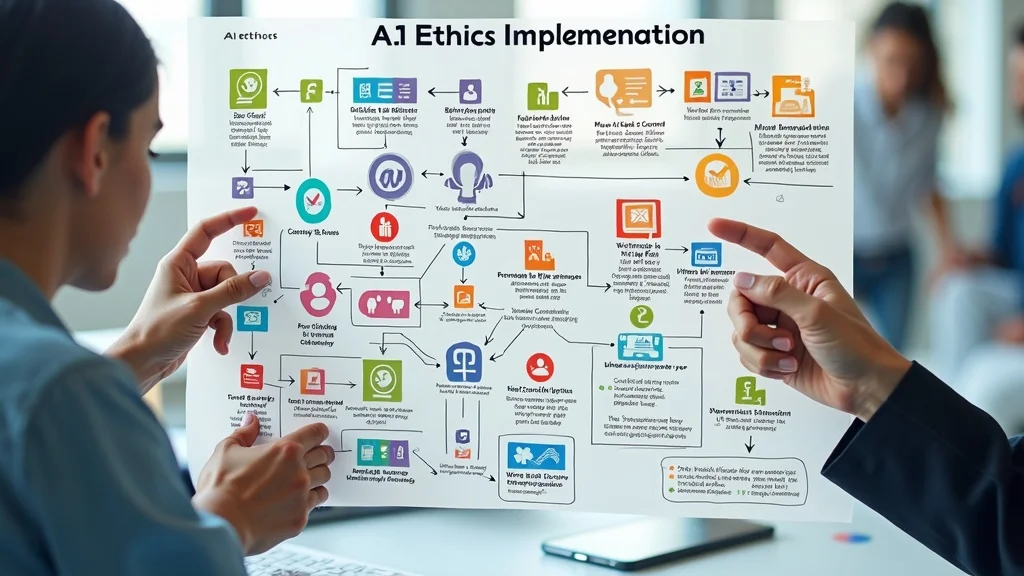Did you know? Despite the rapid expansion of artificial intelligence worldwide, there is no globally agreed definition of what constitutes ethical AI implementation. This fragmentation creates both enormous challenges and unprecedented opportunities for diverse regions to shape AI’s future responsibly.
As AI transforms societies, the question is no longer simply about controlling AI technology — but about who gets to define ethics in AI. In this article, we delve deeply into the evolving landscape of AI ethics implementation across different cultural and socio-economic contexts, highlighting the disparities between principles and reality and uncovering how new voices, especially from emerging regions like Africa, can power meaningful change.
Drawing from expert perspectives from the AI NEXUS AFRICA NEWS editorial team, we explore the urgent need for framing AI ethics in ways that resonate with diverse lived experiences and provide actionable insights for aligning AI development with human-centered values globally.

What You'll Learn
- Understand the current global landscape of AI ethics implementation
- Explore the challenges bridging AI ethical principles and real-world practices
- Discover how diverse cultural and regional contexts shape responsible AI
- Learn expert insights on co-creating ethical AI frameworks
- Review key principles, pillars, and practices for ethical AI development
Overview of AI Ethics Implementation: Defining the Landscape
What is AI Ethics Implementation?
AI ethics implementation refers to the process of translating ethical principles and guidelines into concrete policies, operational practices, and technological designs that govern artificial intelligence systems. It focuses on ensuring AI technologies are developed and deployed in ways that uphold respect for human rights, promote fairness, enhance transparency, and mitigate harm.
Unlike abstract ethical ideals, implementation requires bridging the gap between lofty AI principles and the practical realities of AI systems' impact on diverse populations — a process shaped by local cultural norms, legal frameworks, and socio-economic conditions.
The Current State of AI Governance and Ethical AI
Currently, AI ethics implementation remains a fractured frontier. Globally, there is no universal AI governance structure or shared moral compass. Instead, different countries and institutions are individually crafting their own frameworks — often rooted in varying values, regulations, and technological priorities.
This fragmentation creates a world where the meaning of “responsible AI” differs widely, complicating efforts for cohesive, inclusive, and equitable AI governance. As the Editorial Team of AI NEXUS AFRICA NEWS emphasizes, “Ethical AI is not a fixed destination. It is a conversation, a negotiation, a narrative we are still writing.”
This ongoing discourse highlights that AI ethics implementation is dynamic and contextual, requiring continuous dialogue and adaptation.

Bridging the Gap: From AI Ethics Principles to Practical Implementation
Challenges in Translating AI Ethics into Practice
One of the most pressing issues in AI ethics implementation is the stark divide between principles established in international frameworks and the realities faced on the ground. Policies designed in abstract, centralized settings often fail to accommodate the nuances of cultural diversity, infrastructural limitations, or socio-political environments encountered in practice.
This gap is further exacerbated by uneven power dynamics in AI development, with a majority of ethical deliberations led by stakeholders in a few geopolitical hubs, while marginalized communities bear the brunt of misuse or negligence. The complexity of operationalizing AI ethics lies in reconciling these heterogeneous perspectives and embedding ethical considerations seamlessly within AI life cycles.
For a deeper dive into how emerging technologies are actively reshaping our understanding of ethical boundaries and societal norms, you may find it valuable to explore how future technologies could rewrite reality for us. This perspective offers additional context on the interplay between innovation and ethical adaptation.
The Role of AI Systems and AI Technology in Ethical Implementation
Technological aspects of AI systems profoundly impact ethical outcomes. Algorithms, data sets, and AI models contain inherent biases that can perpetuate discrimination if not proactively addressed. Ethical implementation demands that designers integrate fairness, accountability, and transparency into AI system architecture from inception, avoiding reactive patches down the line.
Achieving responsible AI also requires interdisciplinary collaboration between engineers, ethicists, policymakers, and affected communities to develop robust AI technology aligned with human rights and societal values.
Addressing the Black Box Problem and Data Privacy Concerns
A significant obstacle in AI ethics implementation is the "black box" nature of many AI algorithms, making it extremely difficult to interpret decision-making processes. This opacity challenges transparency and accountability, raising ethical concerns, especially in high-stakes sectors such as healthcare, justice, and finance.
In parallel, safeguarding data privacy has become imperative, as AI increasingly relies on personal and sensitive data. Ethical AI practitioners must implement stringent data protection measures and ensure compliance with privacy laws to build trustworthy AI systems that respect individual rights.

Global Perspectives: How Diverse Realities Shape Responsible AI
Cultural and Regional Variations in AI Ethics
AI ethics implementation cannot be effectively standardized without being grounded in cultural awareness. Different societies prioritize values uniquely; what is considered a fundamental ethical principle in one region may be viewed differently elsewhere. For example, concepts around privacy, consent, fairness, or community well-being vary significantly.
Recognizing and respecting these variations is essential in creating AI governance frameworks that are truly inclusive and effective, ensuring that AI deployment enriches rather than alienates specific communities.

Opportunities for Emerging Regions to Influence AI Governance
Emerging regions, notably Africa, represent a crucial frontier in redefining AI ethics implementation. The Editorial Team of AI NEXUS AFRICA NEWS highlights that “Regions like Africa have a unique opportunity to offer new ethical models grounded in context, community, and care.”
Unlike historically dominant tech powers, these regions can leverage their diverse cultural heritage and lived realities to shape AI governance according to values that prioritize human dignity and social inclusion.
This presents a pivotal chance not just to catch up technologically but to lead ethically, ensuring AI supports sustainable development goals and addresses specific regional challenges such as climate vulnerability and informal economies.
Core Principles and Pillars of Ethical AI Implementation
The 5 Key Principles of AI Ethics
Foundational to effective AI ethics implementation are these five principles: transparency, justice and fairness, non-maleficence, responsibility, and privacy. These guide AI development to be open about its processes, ensure equitable treatment, prevent harm, hold creators accountable, and protect personal data.
The 4 Pillars of Ethical AI
Supporting these principles are four pillars: accountability, inclusivity, reliability, and security. They form the structural basis to operationalize ethics, ensuring every AI system is dependable, embraces diversity, resists misuse, and adheres to legal frameworks.
The 7 Principles of Ethical AI
Expanding further, the 7 principles introduce respect for human rights, sustainability, explainability, and continuous learning as critical elements. This extended framework supports an iterative approach recognizing AI’s evolving nature and sociotechnical impacts.
| Principle or Pillar | Definition | Practical Example in AI Ethics Implementation |
|---|---|---|
| Transparency | Clear disclosure of AI processes and decision-making criteria | Publishing algorithmic design and providing explanations for AI outputs in healthcare diagnostics |
| Justice and Fairness | Ensuring AI does not discriminate based on ethnicity, gender or class | Implementing bias audits and adjusting training data to prevent gender bias in recruitment AI systems |
| Non-Maleficence | Preventing harm to users and society | Rigorous testing before deploying AI-powered autonomous vehicles to avoid accidents |
| Accountability | Assigning responsibility for AI decisions and impacts | Organizations maintaining audit trails and liability frameworks for AI failures |
| Privacy | Protections of user data against misuse and breaches | Applying data anonymization and encryption to protect identities in facial recognition |
Best Practices for Implementing AI Ethics in AI Development
Integrating Ethical Considerations into AI System Design
Ethical AI implementation starts at the design phase by embedding ethical considerations into the AI’s architecture and lifecycle. This means conducting ethical risk assessments, including diverse perspectives in development teams, and designing systems for interpretability and fairness from the ground up.
Practices such as participatory design where end-users contribute feedback ensure systems reflect real-world complexities rather than abstract ideals.
Ensuring Human Rights and Data Protection in AI Practices
Respecting human rights is a cornerstone of ethical AI implementation. Organizations must comply with international human rights standards, implement robust data protection protocols, and avoid exacerbating inequality through AI applications.
The AI engineering teams should uphold stringent data governance policies to ensure personal data is collected and processed transparently and securely, reinforcing trust in AI technologies.

Building Transparent and Accountable AI Governance
To foster trust and ethical adherence, organizations must develop transparent governance structures. This involves creating visible audit trails, explaining AI decision-making clearly, and instituting accountability mechanisms that allow stakeholders to challenge and rectify unethical AI behaviors.
Transparent AI governance ensures that ethical principles are not just aspirational but enforced through measurable, actionable policies and continuous oversight.

Common Misconceptions and Ethical Concerns in AI Ethics Implementation
Debunking Myths about AI Ethics and Responsible AI
A common misconception is that AI ethics are merely theoretical or slow down innovation. In reality, ethical AI implementation fosters sustainable innovation by building public trust and reducing costly regulatory or social backlash.
Another myth is that AI ethics is a one-size-fits-all checklist; however, as we have seen, effective implementation requires nuanced, culturally adaptive approaches.
Addressing Ethical Concerns in AI Development and Deployment
Ethical concerns such as bias, privacy infringement, and lack of transparency are genuine challenges. Addressing these involves proactive mitigation strategies like bias auditing, employing privacy-by-design principles, and creating explainable AI models.
An ongoing commitment to ethical reflection throughout AI’s lifecycle is necessary to adapt to emerging risks and societal expectations.
Actionable Tips for Organizations to Align AI Ethics Implementation with Global Realities
- Engage diverse stakeholders in AI ethics conversations to reflect multiple viewpoints
- Adapt AI ethics frameworks to local cultural and social contexts rather than enforcing rigid global standards
- Prioritize transparency and explainability in AI systems to build trust
- Invest in continuous education and ethical AI training for developers and policymakers
- Monitor and evaluate AI impact on vulnerable communities to ensure no group is disproportionately harmed
People Also Ask: Frequently Asked Questions on AI Ethics Implementation
What is the ethical implementation of AI?
Ethical implementation of AI means applying ethical principles in the design, development, and deployment of AI systems so they respect human rights, promote fairness, ensure transparency, and prevent harm. It bridges the gap between AI ethics theory and real-world application.
What are the 5 key principles of AI ethics?
The five key principles include transparency, justice and fairness, non-maleficence, responsibility, and privacy. These provide foundational guidelines to ensure AI respects users and society.
What are the 4 pillars of ethical AI?
The four pillars are accountability, inclusivity, reliability, and security. They support the structural implementation of ethics in AI systems.
What are the 7 principles of ethical AI?
The seven principles encompass the core five plus respect for human rights, sustainability, and explainability, forming a comprehensive framework for ethical AI practices.
Key Takeaways
- AI ethics implementation is a dynamic, evolving process shaped by diverse global realities.
- Bridging the gap between principles and practice requires inclusive governance and contextual understanding.
- Emerging regions have a critical role in shaping ethical AI frameworks grounded in community values.
- Adhering to core principles and pillars ensures responsible AI development and deployment.
- Ongoing education, transparency, and stakeholder engagement are essential for sustainable AI ethics.
Conclusion: Shaping the Future of AI Ethics Implementation Together
Expertial Team of AI NEXUS AFRICA NEWS concludes, "Who controls the meaning of ethics controls the future of AI. It is our collective responsibility to define and implement AI ethics that reflect the world’s diverse realities."
It is imperative that all stakeholders embrace this challenge with courage and collaboration.
As you continue to navigate the evolving landscape of AI ethics, consider broadening your perspective by examining the transformative potential of emerging technologies on our collective future. Exploring the ways in which future technologies could rewrite reality not only deepens your understanding of ethical implementation, but also equips you to anticipate the next wave of challenges and opportunities. By staying informed about these advancements, you position yourself to contribute meaningfully to the ongoing dialogue around responsible AI. For those ready to take their insight to the next level, delving into the intersection of innovation and ethics is an essential next step.
Call to Action
- Discover The AI Africa News Channel for ongoing insights and updates: https://aiafricanews.com
Sources
- AI NEXUS AFRICA NEWS Editorial Insights
- Oxford Insights: AI Ethics Overview
- United Nations on AI and Ethics
To deepen your understanding of AI ethics implementation, consider exploring the following resources:
-
“AI ethics in action”: This report by IBM’s Institute for Business Value examines how organizations can advance trustworthy AI through formal, strategic approaches to AI ethics. It provides insights into integrating ethical considerations into AI development and deployment. (ibm.com)
-
“Understanding artificial intelligence ethics and safety”: Published by the UK Government, this guidance offers a comprehensive overview of using AI ethically and safely, including establishing ethical building blocks and actionable principles for AI projects. (gov.uk)
These resources offer practical frameworks and insights to help align AI development with ethical standards across diverse global contexts.
 Add Row
Add Row  Add
Add 




Write A Comment